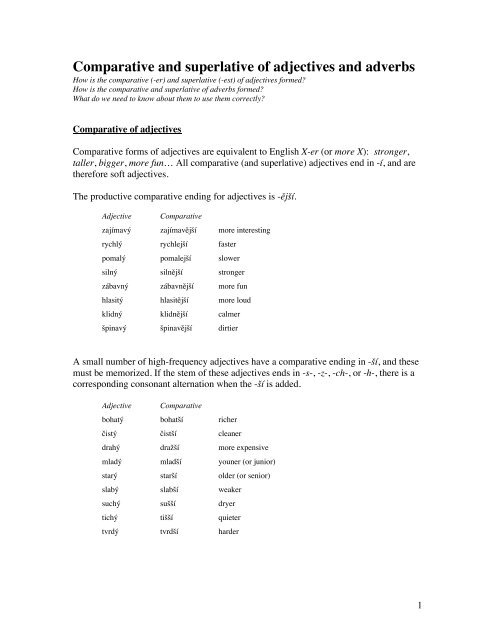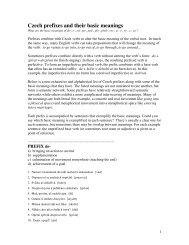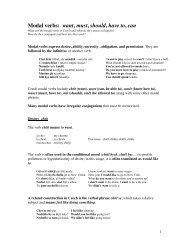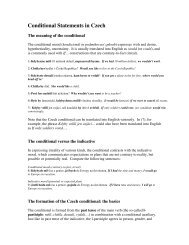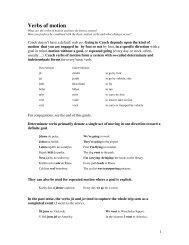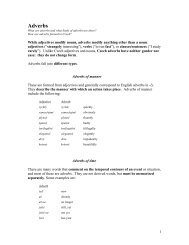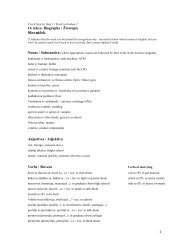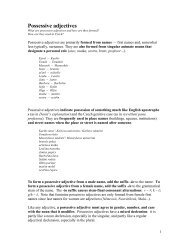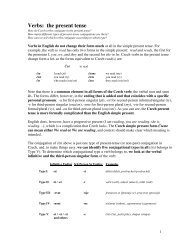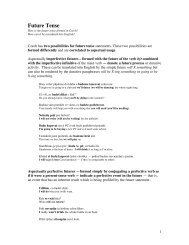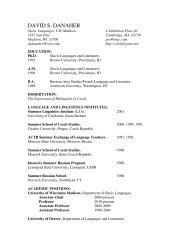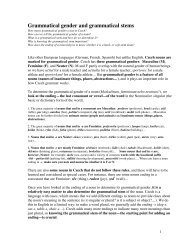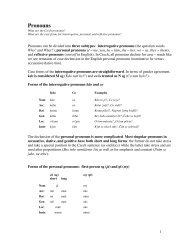Comparative and superlative of adjectives and ... - Cokdybysme.net
Comparative and superlative of adjectives and ... - Cokdybysme.net
Comparative and superlative of adjectives and ... - Cokdybysme.net
- No tags were found...
Create successful ePaper yourself
Turn your PDF publications into a flip-book with our unique Google optimized e-Paper software.
<strong>Comparative</strong> <strong>and</strong> <strong>superlative</strong> <strong>of</strong> <strong>adjectives</strong> <strong>and</strong> adverbsHow is the comparative (-er) <strong>and</strong> <strong>superlative</strong> (-est) <strong>of</strong> <strong>adjectives</strong> formed?How is the comparative <strong>and</strong> <strong>superlative</strong> <strong>of</strong> adverbs formed?What do we need to know about them to use them correctly?<strong>Comparative</strong> <strong>of</strong> <strong>adjectives</strong><strong>Comparative</strong> forms <strong>of</strong> <strong>adjectives</strong> are equivalent to English X-er (or more X): stronger,taller, bigger, more fun… All comparative (<strong>and</strong> <strong>superlative</strong>) <strong>adjectives</strong> end in -í, <strong>and</strong> aretherefore s<strong>of</strong>t <strong>adjectives</strong>.The productive comparative ending for <strong>adjectives</strong> is -ější.Adjective<strong>Comparative</strong>zajímavý zajímavější more interestingrychlý rychlejší fasterpomalý pomalejší slowersilný silnější strongerzábavný zábavnější more funhlasitý hlasitější more loudklidný klidnější calmeršpinavý špinavější dirtierA small number <strong>of</strong> high-frequency <strong>adjectives</strong> have a comparative ending in -ší, <strong>and</strong> thesemust be memorized. If the stem <strong>of</strong> these <strong>adjectives</strong> ends in -s-, -z-, -ch-, or -h-, there is acorresponding consonant alternation when the -ší is added.Adjective<strong>Comparative</strong>bohatý bohatší richerčistý čistší cleanerdrahý dražší more expensivemladý mladší youner (or junior)starý starší older (or senior)slabý slabší weakersuchý sušší dryertichý tišší quietertvrdý tvrdší harder1
Adjectives that end in -oký <strong>and</strong> -eký also take a -ší comparative, but first drop the -oký or-eký ending:Adjective<strong>Comparative</strong>daleký další further, farther; next (in a series)hluboký hlubší deeperširoký širší widervysoký vyšší taller, higherMany <strong>adjectives</strong> that end in -ký fall into one <strong>of</strong> two types when it comes to formation <strong>of</strong>the comparative. The first type adds a -ší ending for the comparative with the -ký beingdropped <strong>and</strong> the stem vowel shortened:Adjective<strong>Comparative</strong>blízký bližší closerkrátký kratší shorternízký nižší lowerřídký řidší rarertěžký těžší more difficultúzký užší more narrowThe second type replaces the -ký by -čí to form the comparative.Adjective <strong>Comparative</strong>hezký hezčí prettier, more h<strong>and</strong>somelehký lehčí lighter, easierměkký měkčí s<strong>of</strong>tervlhký vlhčí more humidFinally, there are irregular comparatives. These are high-frequency words, many <strong>of</strong>which correlate with irregular comparatives in English:Adjective<strong>Comparative</strong>dobrý lepší betteršpatný horší worsemalý menší smallervelký větší biggerdlouhý delší longer2
Adjectival comparisons are facilitated by the use <strong>of</strong> the conjunction než (than):David je starší než ty.David is older than you.To indicate “much more X”, the phrases o mnoho / mnohem (or, in spoken Czech, (v)omoc) is used. To say “a little bit more X”, use o něco plus the comparative form.David je vo moc starší než ty.David is much older than you.Čeština je o něco zajímavější a zábavnější než ruština.Czech is a bit more interesting <strong>and</strong> fun than Russian.Qualifications <strong>of</strong> the comparative that involve a measurement are indicated by thepreposition o plus the accusative case <strong>of</strong> the quantified phrase:David je o dvacet let starší než ty.David is twenty-years older than you.Note also the phrase čím… , tím… , which is equivalent to the English “the more X, themore Y…”.Čím je doutník chladnější, tím lepší je jeho chuť.The cooler a cigar is, the better is its taste.Čím mladší, tím lepší.The younger, the better.Superlative <strong>of</strong> <strong>adjectives</strong>To form the <strong>superlative</strong> <strong>of</strong> <strong>adjectives</strong> (in English, the most X or the X-est form: the mostinteresting, the loudest…), simply add the prefix nej- to the comparative form. Thisapplies to all types <strong>of</strong> formation<strong>Comparative</strong>Superlativezajímavější nejzajímavější the most interestinghlasitý nejhlasitější the most loud, the loudeststarší nejstarší the oldesttišší nejtišší the quietestbližší nejbližší the closestlepší nejlepší the best3
hezčí nejhezčí the prettiest, the most h<strong>and</strong>some<strong>Comparative</strong> <strong>and</strong> <strong>superlative</strong> <strong>of</strong> <strong>adjectives</strong>: examples <strong>of</strong> usageThe following are examples <strong>of</strong> usage <strong>of</strong> the comparative <strong>and</strong> <strong>superlative</strong> <strong>of</strong> <strong>adjectives</strong>generated through Google. Can you identify the comparative or <strong>superlative</strong> <strong>and</strong> translateit in the context <strong>of</strong> the given sentence?1. Na Isl<strong>and</strong>u hrozí erupce další sopka.2. Vodní dýmka je větší zlo než cigarety.3. Čerstvé mléko je zdravější než trvanlivé.4. Blondýnky jsou prý mnohem agresivnější než bru<strong>net</strong>ky.5. “The Matrix” je jeden z nejzajímavějších filmů všech dob.6. Konzervativní pravice a komunisté si jsou bližší, než se zdá?7. Závodní lyžování patří k nejrychlejším sportům na světě.8. Filmy s titulkami jsou mnohem lepší než dabing!9. Falešný přítel je horši než nepřítel.10. Milovat někoho je snadné, ale zapomenout bývá o mnoho těžší.11. Palms Hotel je jeden z nejlepších hotelů na Srí Lance.12. Vodopády Iguazú jsou širší než Vitkoriiny vodopády a třikrát větší než Niagarské vodopády.13. Tyto nano-materiály jsou pevnější a lehčí než ocel.14. Dcera Micka Jaggera je o moc hezčí než tatínek.15. Můj bratr je o rok mladší než já.16. Proč je reklama v televizi hlasitější než ostatní programy?17. Kdo je slabší: žena nebo muž?18. Benzin je v Česku dražší než ve Švýcarsku.19. Který sport je brutálnějši a zábavnější než box? Mixed Martial Arts!20. Záchodové prkýnko je čistši než použivaná klávesnice.21. Vědci IBM vytvořili nejmenší CD mapu na světě — je menší než zrnko.22. Jste mladší než vypadáte?23. Jeho hlas byl o něco tišší než obvykle, ale jasný.24. Severozápadu USA hrozí zemětřesení tisíckrát silnější než na Haiti.25. Vánoční prázdniny v USA jsou delší než v ČR.4
<strong>Comparative</strong> <strong>of</strong> adverbsWhile <strong>adjectives</strong> modify nouns, adverbs modify verbs. <strong>Comparative</strong>s <strong>of</strong> adverbs are <strong>of</strong>tenrendered in English by more X-ly (more quietly, more easily…), but sometimes Englishdoes not distinguish the adverbial from the adjectival comparative (to be faster versus torun faster, to be better versus to sing better…). Czech always does.If the comparative adjective ends in -ější or -čí, then the corresponding comparativeadverb ends in -ěji/-eji:Adjective <strong>and</strong> its comparativeAdverb comparativerychlý rychlejší rychleji more fast, fastersilný silnějsí silněji more stronglyhlasitý hlasitější hlasitěji more loudly, louderlehký lehčí lehčeji more easilyměkký měkčí měkčeji more s<strong>of</strong>tlyThere are many comparative <strong>adjectives</strong> in -ší that have corresponding comparativeadverbs also in -ěji/-eji:Adjective <strong>and</strong> its comparativeAdverb comparativetichý tišší tišeji more quietlyslabý slabší slaběji more weaklytvrdý tvrdší tvrději more hardčistý čistší čistěji more cleanlyBut many words with comparative <strong>adjectives</strong> in -ší have corresponding adverbialcomparatives that are irregular. These must be memorized.Adjective <strong>and</strong> its comparativeAdverb comparativeblízký bližší blíže closerdaleký další dále fartherdlouhý delší déle longerdobrý lepší lépe bettermalý menší méně lessnízký nižší níže lowerširoký širší šíře widervysoký vyšší výše higheršpatný horší hůře worsevelký větší více more5
In spoken Czech, the comparative adverbs immediately above have forms without thefinal -e: blíž, dál, níž, šíř, výš, hůř, víc. In words with -é- in the stem, the vowel alsochanges: dýl, líp, míň.The comparative form <strong>of</strong> the adverb brzo (early) is dříve / dřív (earlier).The comparative <strong>of</strong> the adverb rád is raději or radši (the former is more formal).Britové by se radši vzdali partnera než televize.The British would rather give up their partner than their televisions.Raději tři dny bez soli než jediný den bez čaje.Rather three days without salt then one day without tea.The same uses <strong>of</strong> než <strong>and</strong> o mnoho / mnohem / (v)o moc apply to comparative adverbs asthey do to comparative <strong>adjectives</strong>. The same applies to the phrase čím… , tím… .Čím víc, tím líp.The more, the better.Čím dřive, tím lépe.The earlier, the better.Superlative <strong>of</strong> adverbsTo form the <strong>superlative</strong> <strong>of</strong> adverbs, simply add the prefix nej- to the comparative form.This applies to all types <strong>of</strong> formation.<strong>Comparative</strong>Superlativehlasitěji nejhlasitěji the most loudlytišeji nejtišeji the most quietlyblíže/blíž nejblíže/nejblíž closestlépe/líp nejlépe/nejlíp bestThe phrase co nej- means as X as possible. (This phrase can also be used adjectivally.)Jak co nejlíp prodat byt?How to sell your apartment in the best possible way?Obama chce sankce proti Íránu co nejdřív.Obama wants sanctions against Iran as soon as possible.Snažím se být co nejmíň vidět.I try to be seen as little as possible.6
The <strong>superlative</strong> <strong>of</strong> rád is nejraději or nejradši.Kdo nejraději spí nahý?Who most likes to sleep naked?Které roční období máte nejradši?Which season do you like the most?<strong>Comparative</strong> <strong>and</strong> <strong>superlative</strong> <strong>of</strong> adverbs: examples <strong>of</strong> usageThe following are examples <strong>of</strong> usage <strong>of</strong> the comparative <strong>and</strong> <strong>superlative</strong> <strong>of</strong> adverbsgenerated through Google. Can you identify the comparative or <strong>superlative</strong> <strong>and</strong> translateit in the context <strong>of</strong> the given sentence?1. Ženy v EU berou mnohem méně než muži.2. Počet uživatelů Firefoxu roste rychleji než u Google Chrome.3. Kůn má k člověku ge<strong>net</strong>icky blíž než pes, tvrdí vědci.4. Na facebooku strávím nejmíň 3 hodiny denně.5. Muži snášejí rozvod či rozchod hůře než ženy.6. Čím více se premiér zlobí, tím mluví tišeji.7. Při protiútoku vždy co nejsilněji vykřiknout.8. Biopaliva hoří mnohem efektivněji a čistěji než klasická paliva jako ropa a uhlí.9. Více než třetina zemského povrchu se postupně mění na poušť.10. Problémy USA sahají dál než na Wall Street.11. Omluvil jsem se jí co nejlíp.12. Hokejka se ovládá lehčeji než meč.13. Nikdo nepracuje více než Lady GaGa!14. Tým trénoval mnohem tvrději než dřív.15. Můj muž chrápe hlasitěji než stíhačka!7


